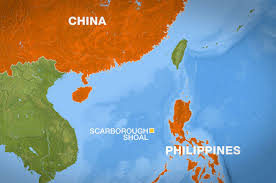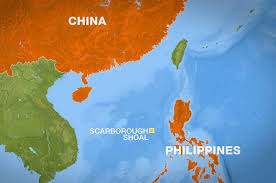
As Philippine President Rodrigo Duterte considers resuming energy exploration in the tension-laden South China Sea, Manila appears to be testing its relationship with Beijing.
Located in the international waterway, the oil and gas drilling in the Reed Bank has been suspended since 2014. In an issue that has sparked numerous Philippine protests against the mainland and weighed on bilateral ties, the drilling project came after Manila launched an international arbitration case against Beijing over the latter's territorial expansion in the South China Sea. Ismael Ocampo, a director at the Philippines' Department of Energy's Resource Development Bureau, said that the activity in the Reed Bank could recommence before year-end, reported Reuters. Believed to hold significant oil and gas deposits, the feature is an underwater mountain off the Philippine coast.
Ocampo said in a corporate bidding round set for December, in addition to areas around Palawan and the Sulu Sea, over 20 oil, gas and coal blocks in the Reed Bank could be offered.
Manila’s access to the offshore oil and gas fields in its 200-mile Exclusive Economic Zone that includes the Reed Bank was validated by a tribunal at the International Court of Justice in The Hague about a year ago. however, the verdict has bene refused to be accepted and even recognized by Beijing. And since then, in order to secure mainland investments, Duterte has opted to improve existing ties with the North Asian giant instead and that investment has been stalled by him on the pretext of enforcing the court decision.
But, should Manila attempt drilling of oil and gas in the South China Sea's contentious waters, Chinese President Xi Jinping had warned of war, the Philippine leader had claimed earlier this year.
However, Duterte may be changing his mind on the matter was indicated by the latest announcement.
According to Eufracia Taylor, Asia analyst at risk advisory firm Verisk Maplecroft, the new development points to a few potential scenarios.
"Manila is largely hoping for the best, and plans could be highly vulnerable to a direct rebuke from China," she wrote in a Thursday note. "Having watched Vietnam develop disputed offshore areas, with the absence of physical intervention from China, Manila is also testing the boundaries."
Alternatively, she continued that Manila traded a softer stance in the South China Sea for exploration rights and it may have sought direct approval from China.
If December's bidding round does materialize, the murky political situation could impact corporate demand for energy drilling regardless of the geopolitical situation.
Taylor said that while it "may be eager to continue with exploration, other companies will be wary of China's position on drilling in disputed waters," while talking about upstream oil and gas company PXP Energy which was one of the companies whose Reed Bank operations were disrupted in 2014.
Taylor noted that especially as the country's Malampaya natural gas field, also located in the South China Sea, winds down, the decision to restart drilling also highlights Manila’s energy security concerns.
(Source:www.cnbc.com)
Located in the international waterway, the oil and gas drilling in the Reed Bank has been suspended since 2014. In an issue that has sparked numerous Philippine protests against the mainland and weighed on bilateral ties, the drilling project came after Manila launched an international arbitration case against Beijing over the latter's territorial expansion in the South China Sea. Ismael Ocampo, a director at the Philippines' Department of Energy's Resource Development Bureau, said that the activity in the Reed Bank could recommence before year-end, reported Reuters. Believed to hold significant oil and gas deposits, the feature is an underwater mountain off the Philippine coast.
Ocampo said in a corporate bidding round set for December, in addition to areas around Palawan and the Sulu Sea, over 20 oil, gas and coal blocks in the Reed Bank could be offered.
Manila’s access to the offshore oil and gas fields in its 200-mile Exclusive Economic Zone that includes the Reed Bank was validated by a tribunal at the International Court of Justice in The Hague about a year ago. however, the verdict has bene refused to be accepted and even recognized by Beijing. And since then, in order to secure mainland investments, Duterte has opted to improve existing ties with the North Asian giant instead and that investment has been stalled by him on the pretext of enforcing the court decision.
But, should Manila attempt drilling of oil and gas in the South China Sea's contentious waters, Chinese President Xi Jinping had warned of war, the Philippine leader had claimed earlier this year.
However, Duterte may be changing his mind on the matter was indicated by the latest announcement.
According to Eufracia Taylor, Asia analyst at risk advisory firm Verisk Maplecroft, the new development points to a few potential scenarios.
"Manila is largely hoping for the best, and plans could be highly vulnerable to a direct rebuke from China," she wrote in a Thursday note. "Having watched Vietnam develop disputed offshore areas, with the absence of physical intervention from China, Manila is also testing the boundaries."
Alternatively, she continued that Manila traded a softer stance in the South China Sea for exploration rights and it may have sought direct approval from China.
If December's bidding round does materialize, the murky political situation could impact corporate demand for energy drilling regardless of the geopolitical situation.
Taylor said that while it "may be eager to continue with exploration, other companies will be wary of China's position on drilling in disputed waters," while talking about upstream oil and gas company PXP Energy which was one of the companies whose Reed Bank operations were disrupted in 2014.
Taylor noted that especially as the country's Malampaya natural gas field, also located in the South China Sea, winds down, the decision to restart drilling also highlights Manila’s energy security concerns.
(Source:www.cnbc.com)





